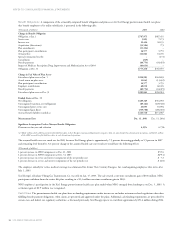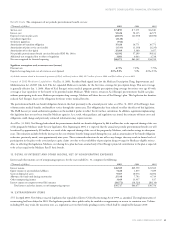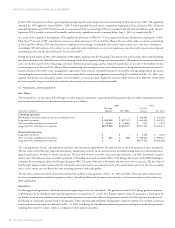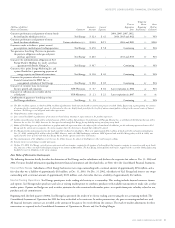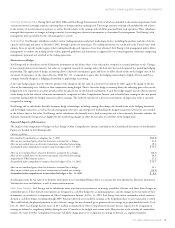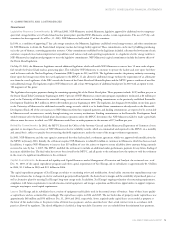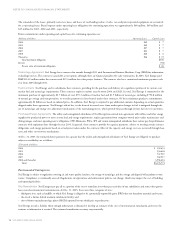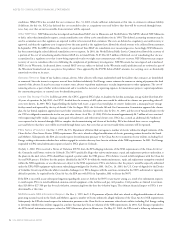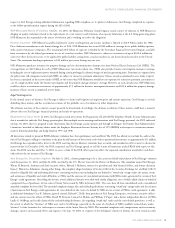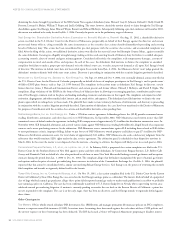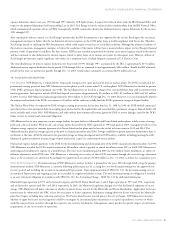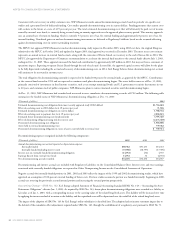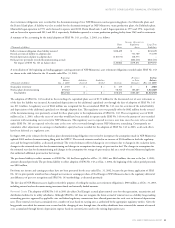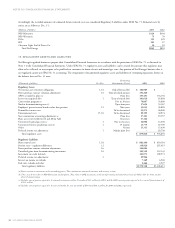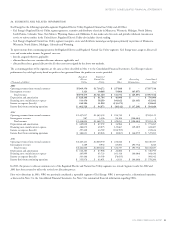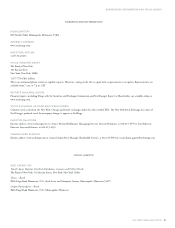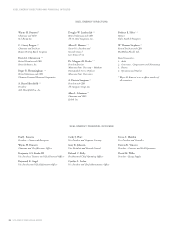Xcel Energy 2003 Annual Report Download - page 62
Download and view the complete annual report
Please find page 62 of the 2003 Xcel Energy annual report below. You can navigate through the pages in the report by either clicking on the pages listed below, or by using the keyword search tool below to find specific information within the annual report.78 XCEL ENERGY 2003 ANNUAL REPORT
NOTES TO CONSOLIDATED FINANCIAL STATEMENTS
conditions. While PSCo has recorded this cost estimate at Dec. 31, 2003, it lacks sufficient information at this time to estimate its ultimate liability,
if different, for this site. PSCo has deferred the cost recorded to date as a regulatory asset and believes that they will be recovered through future
rates. Any costs that are not recoverable from customers will be expensed.
Other MGP Sites NSP-Minnesota has investigated and remediated MGP sites in Minnesota and North Dakota. The MPUC allowed NSP-Minnesota
to defer, rather than immediately expense, certain remediation costs of four active remediation sites in 1994. This deferral accounting treatment may be
used to accumulate costs that regulators are expected to allow to be recovered from customers. The costs are deferred as a regulatory asset until recovery is
approved, and then the regulatory asset is expensed over the same period as the regulators have allowed the related revenue to be collected from customers.
In September 1998, the MPUC allowed the recovery of a portion of these MGP site remediation costs in natural gas rates. Accordingly, NSP-Minnesota
has been amortizing the related deferred remediation costs to expense. In 2001, the North Dakota Public Service Commission allowed the recovery of
a portion of the cost of remediating another former MGP site in Grand Forks, N.D. The $2.9 million of deferred cost of remediating that site was
accumulated in a regulatory asset that is now being expensed evenly over eight years commensurate with cost recovery. NSP-Minnesota may request
recovery of costs to remediate other sites following the completion of preliminary investigations. NSP-Wisconsin has investigated and remediated
MGP sites in Wisconsin. As discussed above, external MGP costs are subject to deferral in the Wisconsin retail jurisdiction and are reviewed as part of
the Wisconsin biennial retail rate case process for prudence. Once approved by the PSCW, deferred MGP amounts, less carrying costs, are historically
amortized over four or six years.
Asbestos Removal Some of our facilities contain asbestos. Most asbestos will remain undisturbed until the facilities that contain it are demolished
or renovated. Since the intent is to operate most of these facilities indefinitely, Xcel Energy cannot estimate the amount or timing of payments for final
removal of the asbestos. It may be necessary to remove some asbestos to perform maintenance or make improvements to other equipment. The cost of
removing asbestos as part of other work is immaterial and is recorded as incurred as operating expenses for maintenance projects; capital expenditures
for construction projects; or removal costs for demolition projects.
Leyden Gas Storage Facility In February 2001, the CPUC approved PSCo’s plan to abandon the Leyden natural gas storage facility (Leyden) after
40 years of operation. In July 2001, the CPUC decided that the recovery of all Leyden costs would be addressed in a future rate proceeding when all
costs were known. In 2003, PSCo began flooding the facility with water, as part of an overall plan to convert Leyden into a municipal water storage
facility owned and operated by the city of Arvada, Colo. In August 2003, the Colorado Oil and Gas Conservation Commission approved the closure
plan, the last formal regulatory approval necessary before conversion. Leyden is expected to close by Dec. 31, 2005, and the city of Arvada will take over the
site. PSCo is obligated to monitor the site for two years after closure. As of Dec. 31, 2003, PSCo has incurred approximately $4.7 million of costs associated
with engineering buffer studies, damage claims paid to landowners and other initial closure costs. PSCo has accrued an additional $4.7 million of
costs expected to be incurred through 2006 to complete the decommissioning and closure of the facility. PSCo has deferred these costs as a regulatory
asset and believes that these costs will be recovered through future rates. Any costs that are not recoverable from customers will be expensed.
PSCo Notice of Violation On Nov. 3, 1999, the U.S. Department of Justice filed suit against a number of electric utilities for alleged violations of the
Clean Air Act’s New Source Review (NSR) requirements. The suit is related to alleged modifications of electric generating stations located in the South
and Midwest. Subsequently, the EPA also issued requests for information pursuant to the Clean Air Act to numerous electric utilities, including Xcel
Energy, seeking to determine whether these utilities engaged in activities that may have been in violation of the NSR requirements. In 2001, Xcel Energy
responded to EPA’s initial information requests related to PSCo plants in Colorado.
On July 1, 2002, PSCo received a Notice of Violation (NOV) from the EPA alleging violations of the NSR requirements of the Clean Air Act at
the Comanche and Pawnee stations in Colorado. The NOV specifically alleges that various maintenance, repair and replacement projects undertaken at
the plants in the mid- to late-1990s should have required a permit under the NSR process. PSCo believes it acted in full compliance with the Clean Air
Act and NSR process. It believes that the projects identified in the NOV fit within the routine maintenance, repair and replacement exemption contained
within the NSR regulations, or are otherwise not subject to the NSR requirements. PSCo also believes that the projects would be expressly authorized
under the EPA’s NSR equipment-replacement rulemaking promulgated in October 2003. On Dec. 24, 2003, the U.S. Court of Appeals for the District
of Columbia Circuit stayed this rule while it considers challenges to it. PSCo disagrees with the assertions contained in the NOV and intends to vigorously
defend its position. As required by the Clean Air Act, the EPA met with PSCo in September 2002 to discuss the NOV.
If the EPA is successful in any subsequent litigation regarding the issues set forth in the NOV or any matter arising as a result of its information requests,
it could require PSCo to install additional emission-control equipment at the facilities and pay civil penalties. Civil penalties are limited to not more
than $25,000 to $27,500 per day for each violation, commencing from the date the violation began. The ultimate financial impact to PSCo is not
determinable at this time.
NSP-Minnesota NSR Information Request On Nov. 3, 1999, the U.S. Department of Justice filed suit, related to alleged modifications of electric
generating stations located in the South and Midwest, against a number of electric utilities for alleged violations of the Clean Air Act’s NSR requirements.
Subsequently, the EPA also issued requests for information pursuant to the Clean Air Act to numerous other electric utilities, including Xcel Energy, seeking
to determine whether these utilities engaged in activities that may have been in violation of the NSR requirements. In 2001, Xcel Energy responded to
the EPA’s initial information requests related to NSP-Minnesota plants in Minnesota. On May 22, 2002, the EPA issued a follow-up information


